Personal Reflection Report: Business Practice Explored (BSS005-1)
VerifiedAdded on 2023/01/09
|6
|1333
|68
Report
AI Summary
This report is a personal reflection on a student's fitness for a business environment, as required by the Business Practice Explored (BSS005-1) unit. The student employs the Gibbs model to analyze a teaching experience at an Oxford Education College, evaluating strengths and weaknesses in terms of skill sets. The report details the situation, feelings, evaluation, and analysis of the experience, followed by a conclusion and an action plan. The action plan involves creating bonds with peers, participating in presentation skills programs, and developing Information Communication and Technology skills. The conclusion emphasizes the importance of building trust, teamwork, and problem-solving skills for professional development. The report references several academic sources to support the analysis and recommendations.
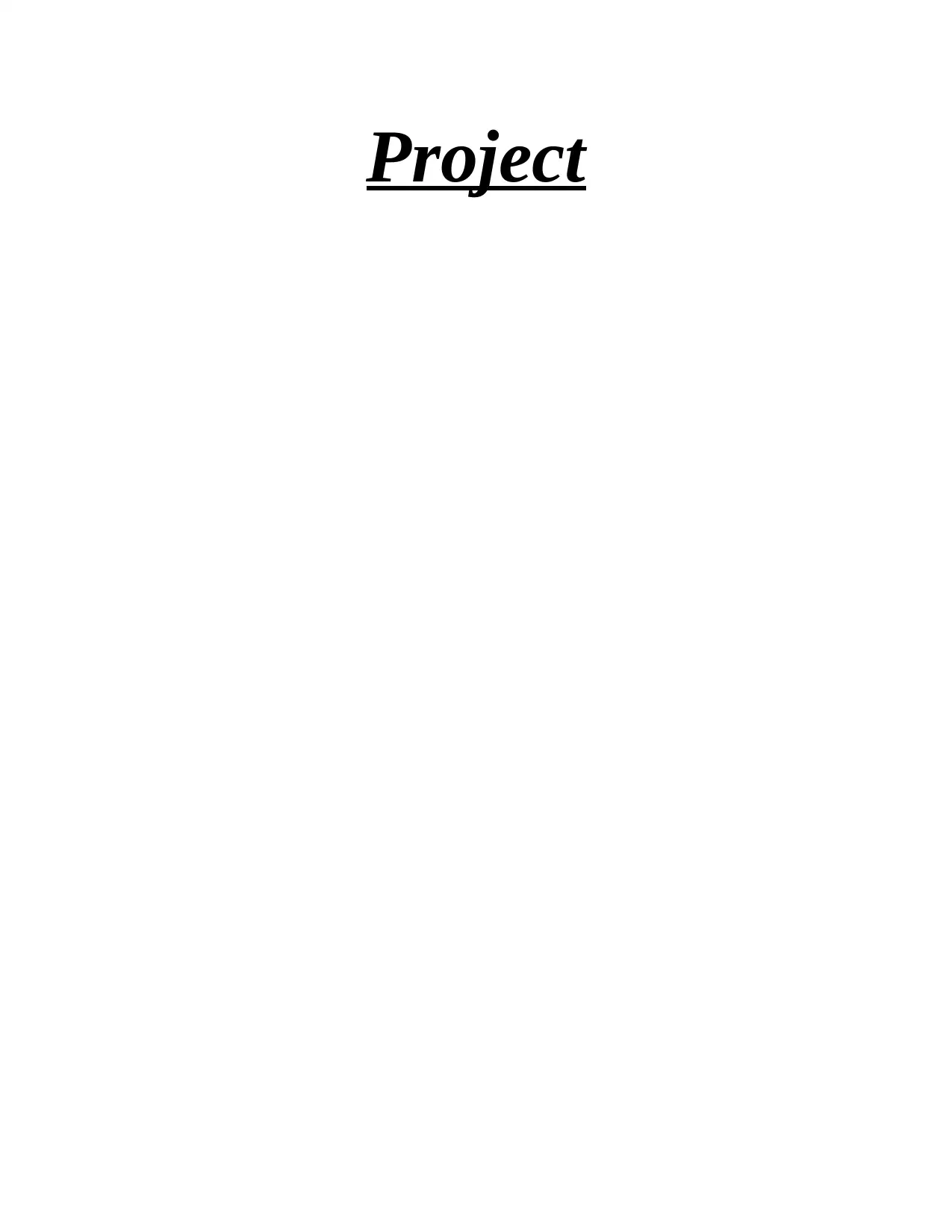
Project
Paraphrase This Document
Need a fresh take? Get an instant paraphrase of this document with our AI Paraphraser
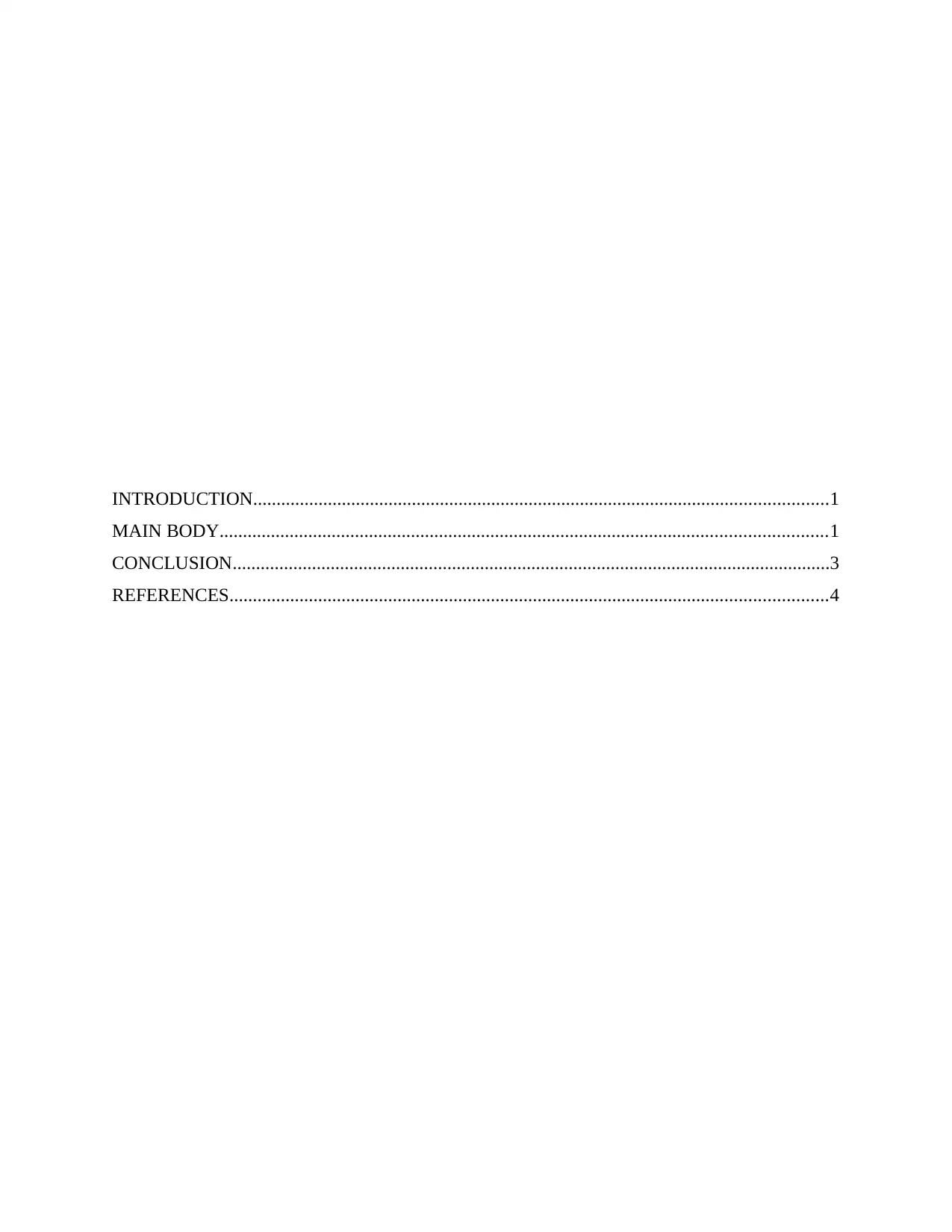
INTRODUCTION...........................................................................................................................1
MAIN BODY..................................................................................................................................1
CONCLUSION................................................................................................................................3
REFERENCES................................................................................................................................4
MAIN BODY..................................................................................................................................1
CONCLUSION................................................................................................................................3
REFERENCES................................................................................................................................4
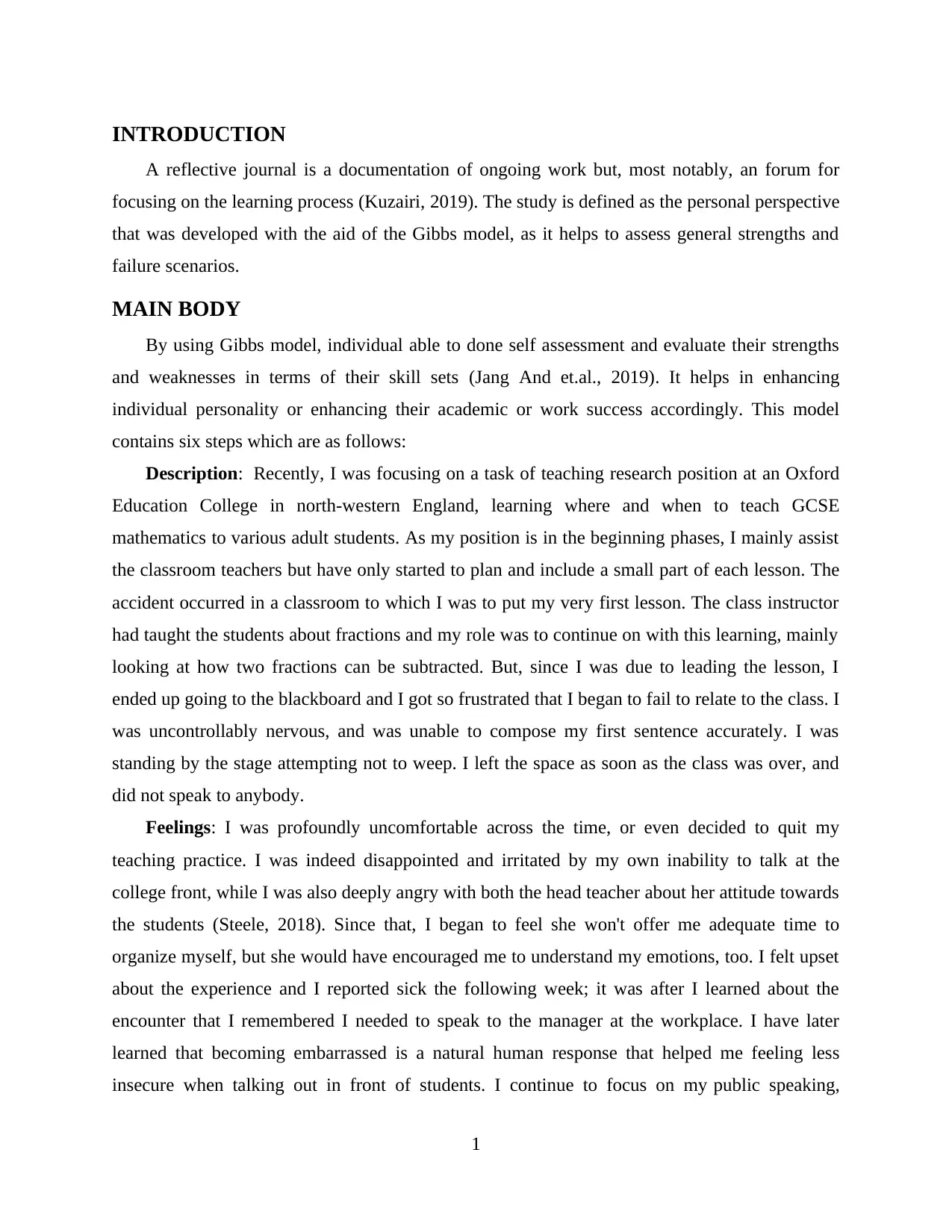
INTRODUCTION
A reflective journal is a documentation of ongoing work but, most notably, an forum for
focusing on the learning process (Kuzairi, 2019). The study is defined as the personal perspective
that was developed with the aid of the Gibbs model, as it helps to assess general strengths and
failure scenarios.
MAIN BODY
By using Gibbs model, individual able to done self assessment and evaluate their strengths
and weaknesses in terms of their skill sets (Jang And et.al., 2019). It helps in enhancing
individual personality or enhancing their academic or work success accordingly. This model
contains six steps which are as follows:
Description: Recently, I was focusing on a task of teaching research position at an Oxford
Education College in north-western England, learning where and when to teach GCSE
mathematics to various adult students. As my position is in the beginning phases, I mainly assist
the classroom teachers but have only started to plan and include a small part of each lesson. The
accident occurred in a classroom to which I was to put my very first lesson. The class instructor
had taught the students about fractions and my role was to continue on with this learning, mainly
looking at how two fractions can be subtracted. But, since I was due to leading the lesson, I
ended up going to the blackboard and I got so frustrated that I began to fail to relate to the class. I
was uncontrollably nervous, and was unable to compose my first sentence accurately. I was
standing by the stage attempting not to weep. I left the space as soon as the class was over, and
did not speak to anybody.
Feelings: I was profoundly uncomfortable across the time, or even decided to quit my
teaching practice. I was indeed disappointed and irritated by my own inability to talk at the
college front, while I was also deeply angry with both the head teacher about her attitude towards
the students (Steele, 2018). Since that, I began to feel she won't offer me adequate time to
organize myself, but she would have encouraged me to understand my emotions, too. I felt upset
about the experience and I reported sick the following week; it was after I learned about the
encounter that I remembered I needed to speak to the manager at the workplace. I have later
learned that becoming embarrassed is a natural human response that helped me feeling less
insecure when talking out in front of students. I continue to focus on my public speaking,
1
A reflective journal is a documentation of ongoing work but, most notably, an forum for
focusing on the learning process (Kuzairi, 2019). The study is defined as the personal perspective
that was developed with the aid of the Gibbs model, as it helps to assess general strengths and
failure scenarios.
MAIN BODY
By using Gibbs model, individual able to done self assessment and evaluate their strengths
and weaknesses in terms of their skill sets (Jang And et.al., 2019). It helps in enhancing
individual personality or enhancing their academic or work success accordingly. This model
contains six steps which are as follows:
Description: Recently, I was focusing on a task of teaching research position at an Oxford
Education College in north-western England, learning where and when to teach GCSE
mathematics to various adult students. As my position is in the beginning phases, I mainly assist
the classroom teachers but have only started to plan and include a small part of each lesson. The
accident occurred in a classroom to which I was to put my very first lesson. The class instructor
had taught the students about fractions and my role was to continue on with this learning, mainly
looking at how two fractions can be subtracted. But, since I was due to leading the lesson, I
ended up going to the blackboard and I got so frustrated that I began to fail to relate to the class. I
was uncontrollably nervous, and was unable to compose my first sentence accurately. I was
standing by the stage attempting not to weep. I left the space as soon as the class was over, and
did not speak to anybody.
Feelings: I was profoundly uncomfortable across the time, or even decided to quit my
teaching practice. I was indeed disappointed and irritated by my own inability to talk at the
college front, while I was also deeply angry with both the head teacher about her attitude towards
the students (Steele, 2018). Since that, I began to feel she won't offer me adequate time to
organize myself, but she would have encouraged me to understand my emotions, too. I felt upset
about the experience and I reported sick the following week; it was after I learned about the
encounter that I remembered I needed to speak to the manager at the workplace. I have later
learned that becoming embarrassed is a natural human response that helped me feeling less
insecure when talking out in front of students. I continue to focus on my public speaking,
1
⊘ This is a preview!⊘
Do you want full access?
Subscribe today to unlock all pages.

Trusted by 1+ million students worldwide
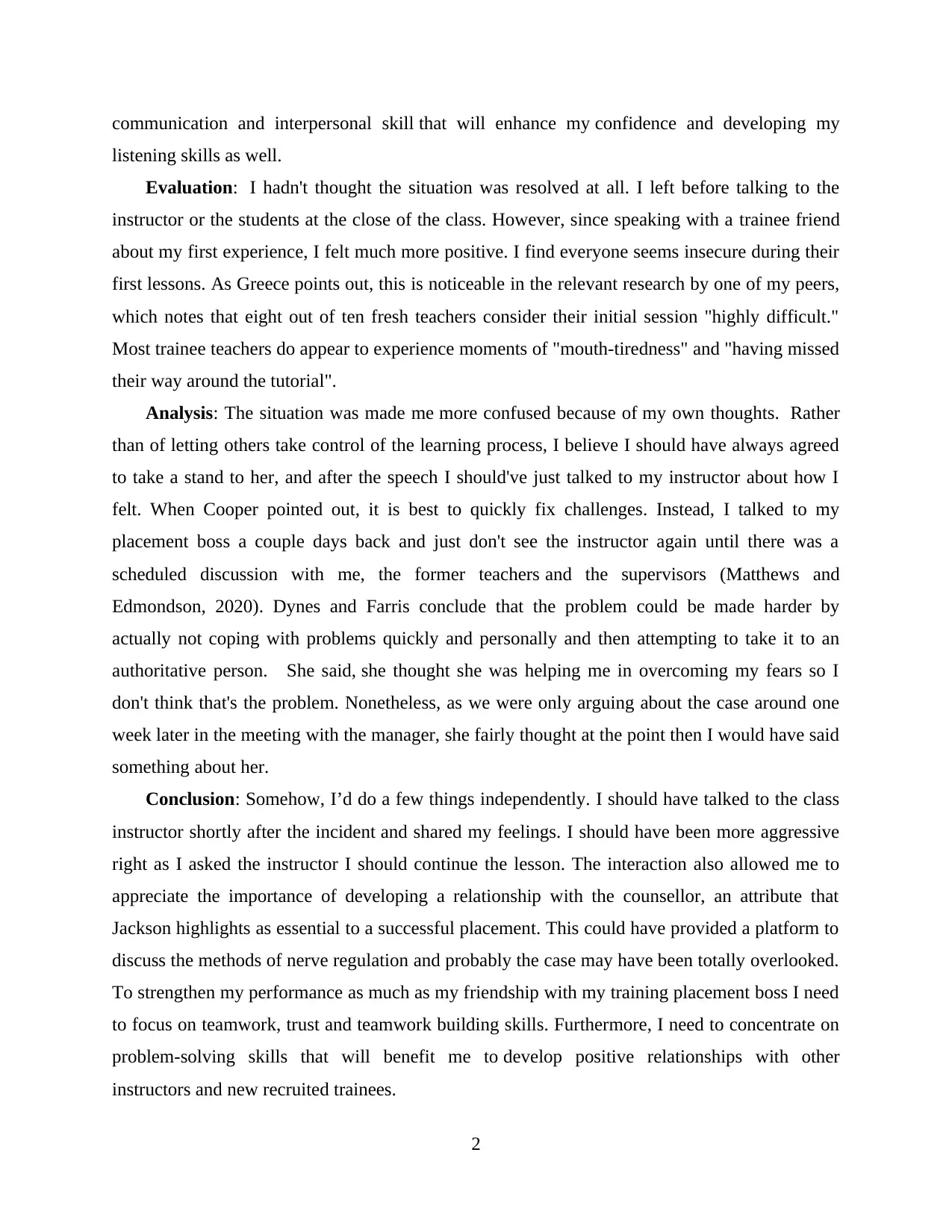
communication and interpersonal skill that will enhance my confidence and developing my
listening skills as well.
Evaluation: I hadn't thought the situation was resolved at all. I left before talking to the
instructor or the students at the close of the class. However, since speaking with a trainee friend
about my first experience, I felt much more positive. I find everyone seems insecure during their
first lessons. As Greece points out, this is noticeable in the relevant research by one of my peers,
which notes that eight out of ten fresh teachers consider their initial session "highly difficult."
Most trainee teachers do appear to experience moments of "mouth-tiredness" and "having missed
their way around the tutorial".
Analysis: The situation was made me more confused because of my own thoughts. Rather
than of letting others take control of the learning process, I believe I should have always agreed
to take a stand to her, and after the speech I should've just talked to my instructor about how I
felt. When Cooper pointed out, it is best to quickly fix challenges. Instead, I talked to my
placement boss a couple days back and just don't see the instructor again until there was a
scheduled discussion with me, the former teachers and the supervisors (Matthews and
Edmondson, 2020). Dynes and Farris conclude that the problem could be made harder by
actually not coping with problems quickly and personally and then attempting to take it to an
authoritative person. She said, she thought she was helping me in overcoming my fears so I
don't think that's the problem. Nonetheless, as we were only arguing about the case around one
week later in the meeting with the manager, she fairly thought at the point then I would have said
something about her.
Conclusion: Somehow, I’d do a few things independently. I should have talked to the class
instructor shortly after the incident and shared my feelings. I should have been more aggressive
right as I asked the instructor I should continue the lesson. The interaction also allowed me to
appreciate the importance of developing a relationship with the counsellor, an attribute that
Jackson highlights as essential to a successful placement. This could have provided a platform to
discuss the methods of nerve regulation and probably the case may have been totally overlooked.
To strengthen my performance as much as my friendship with my training placement boss I need
to focus on teamwork, trust and teamwork building skills. Furthermore, I need to concentrate on
problem-solving skills that will benefit me to develop positive relationships with other
instructors and new recruited trainees.
2
listening skills as well.
Evaluation: I hadn't thought the situation was resolved at all. I left before talking to the
instructor or the students at the close of the class. However, since speaking with a trainee friend
about my first experience, I felt much more positive. I find everyone seems insecure during their
first lessons. As Greece points out, this is noticeable in the relevant research by one of my peers,
which notes that eight out of ten fresh teachers consider their initial session "highly difficult."
Most trainee teachers do appear to experience moments of "mouth-tiredness" and "having missed
their way around the tutorial".
Analysis: The situation was made me more confused because of my own thoughts. Rather
than of letting others take control of the learning process, I believe I should have always agreed
to take a stand to her, and after the speech I should've just talked to my instructor about how I
felt. When Cooper pointed out, it is best to quickly fix challenges. Instead, I talked to my
placement boss a couple days back and just don't see the instructor again until there was a
scheduled discussion with me, the former teachers and the supervisors (Matthews and
Edmondson, 2020). Dynes and Farris conclude that the problem could be made harder by
actually not coping with problems quickly and personally and then attempting to take it to an
authoritative person. She said, she thought she was helping me in overcoming my fears so I
don't think that's the problem. Nonetheless, as we were only arguing about the case around one
week later in the meeting with the manager, she fairly thought at the point then I would have said
something about her.
Conclusion: Somehow, I’d do a few things independently. I should have talked to the class
instructor shortly after the incident and shared my feelings. I should have been more aggressive
right as I asked the instructor I should continue the lesson. The interaction also allowed me to
appreciate the importance of developing a relationship with the counsellor, an attribute that
Jackson highlights as essential to a successful placement. This could have provided a platform to
discuss the methods of nerve regulation and probably the case may have been totally overlooked.
To strengthen my performance as much as my friendship with my training placement boss I need
to focus on teamwork, trust and teamwork building skills. Furthermore, I need to concentrate on
problem-solving skills that will benefit me to develop positive relationships with other
instructors and new recruited trainees.
2
Paraphrase This Document
Need a fresh take? Get an instant paraphrase of this document with our AI Paraphraser
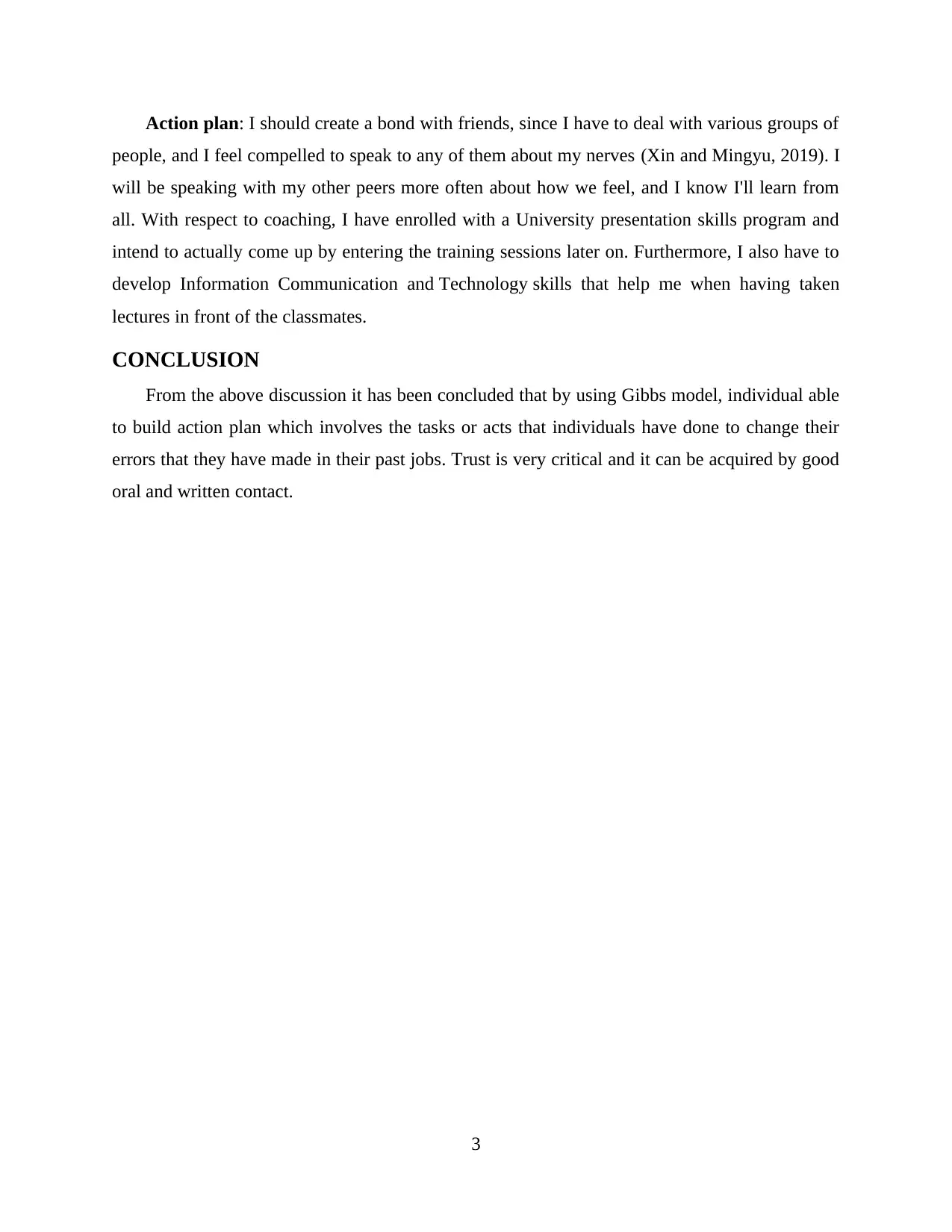
Action plan: I should create a bond with friends, since I have to deal with various groups of
people, and I feel compelled to speak to any of them about my nerves (Xin and Mingyu, 2019). I
will be speaking with my other peers more often about how we feel, and I know I'll learn from
all. With respect to coaching, I have enrolled with a University presentation skills program and
intend to actually come up by entering the training sessions later on. Furthermore, I also have to
develop Information Communication and Technology skills that help me when having taken
lectures in front of the classmates.
CONCLUSION
From the above discussion it has been concluded that by using Gibbs model, individual able
to build action plan which involves the tasks or acts that individuals have done to change their
errors that they have made in their past jobs. Trust is very critical and it can be acquired by good
oral and written contact.
3
people, and I feel compelled to speak to any of them about my nerves (Xin and Mingyu, 2019). I
will be speaking with my other peers more often about how we feel, and I know I'll learn from
all. With respect to coaching, I have enrolled with a University presentation skills program and
intend to actually come up by entering the training sessions later on. Furthermore, I also have to
develop Information Communication and Technology skills that help me when having taken
lectures in front of the classmates.
CONCLUSION
From the above discussion it has been concluded that by using Gibbs model, individual able
to build action plan which involves the tasks or acts that individuals have done to change their
errors that they have made in their past jobs. Trust is very critical and it can be acquired by good
oral and written contact.
3
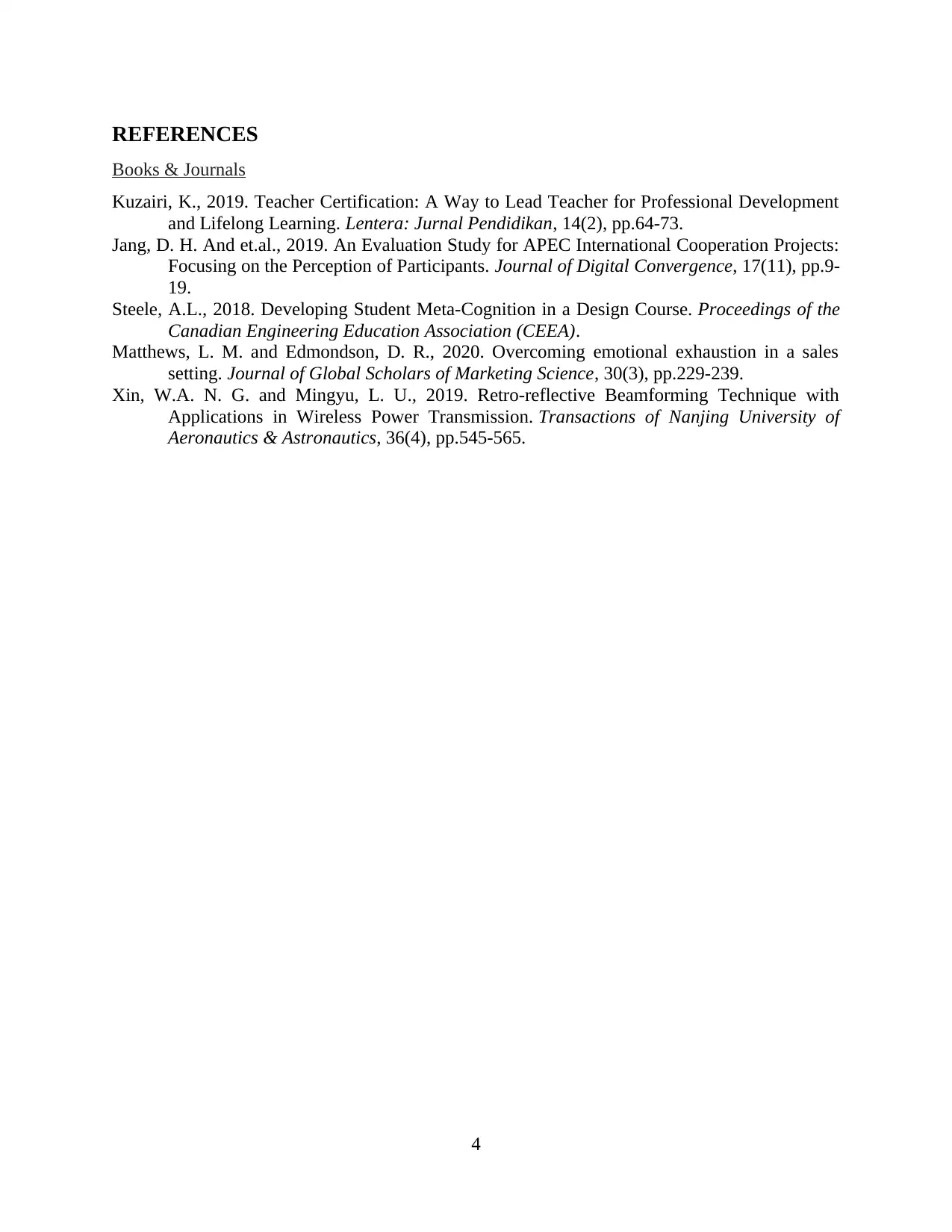
REFERENCES
Books & Journals
Kuzairi, K., 2019. Teacher Certification: A Way to Lead Teacher for Professional Development
and Lifelong Learning. Lentera: Jurnal Pendidikan, 14(2), pp.64-73.
Jang, D. H. And et.al., 2019. An Evaluation Study for APEC International Cooperation Projects:
Focusing on the Perception of Participants. Journal of Digital Convergence, 17(11), pp.9-
19.
Steele, A.L., 2018. Developing Student Meta-Cognition in a Design Course. Proceedings of the
Canadian Engineering Education Association (CEEA).
Matthews, L. M. and Edmondson, D. R., 2020. Overcoming emotional exhaustion in a sales
setting. Journal of Global Scholars of Marketing Science, 30(3), pp.229-239.
Xin, W.A. N. G. and Mingyu, L. U., 2019. Retro-reflective Beamforming Technique with
Applications in Wireless Power Transmission. Transactions of Nanjing University of
Aeronautics & Astronautics, 36(4), pp.545-565.
4
Books & Journals
Kuzairi, K., 2019. Teacher Certification: A Way to Lead Teacher for Professional Development
and Lifelong Learning. Lentera: Jurnal Pendidikan, 14(2), pp.64-73.
Jang, D. H. And et.al., 2019. An Evaluation Study for APEC International Cooperation Projects:
Focusing on the Perception of Participants. Journal of Digital Convergence, 17(11), pp.9-
19.
Steele, A.L., 2018. Developing Student Meta-Cognition in a Design Course. Proceedings of the
Canadian Engineering Education Association (CEEA).
Matthews, L. M. and Edmondson, D. R., 2020. Overcoming emotional exhaustion in a sales
setting. Journal of Global Scholars of Marketing Science, 30(3), pp.229-239.
Xin, W.A. N. G. and Mingyu, L. U., 2019. Retro-reflective Beamforming Technique with
Applications in Wireless Power Transmission. Transactions of Nanjing University of
Aeronautics & Astronautics, 36(4), pp.545-565.
4
⊘ This is a preview!⊘
Do you want full access?
Subscribe today to unlock all pages.

Trusted by 1+ million students worldwide
1 out of 6
Related Documents
Your All-in-One AI-Powered Toolkit for Academic Success.
+13062052269
info@desklib.com
Available 24*7 on WhatsApp / Email
![[object Object]](/_next/static/media/star-bottom.7253800d.svg)
Unlock your academic potential
Copyright © 2020–2026 A2Z Services. All Rights Reserved. Developed and managed by ZUCOL.





